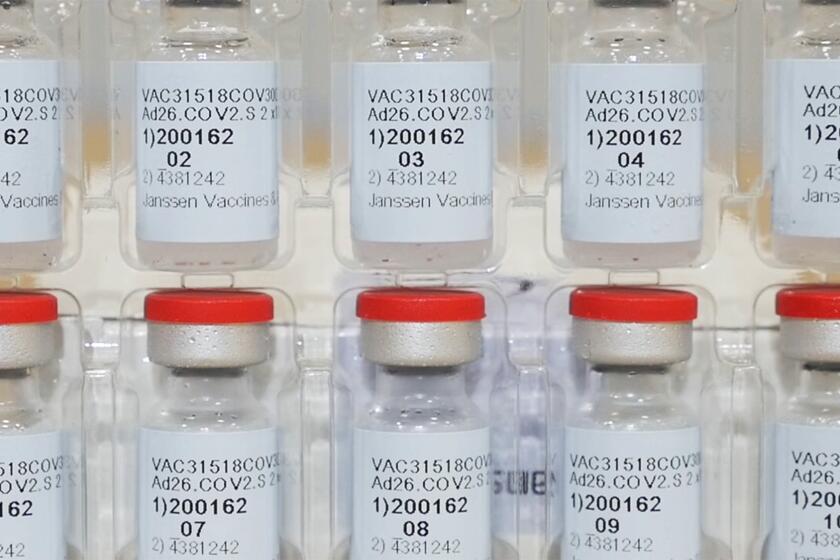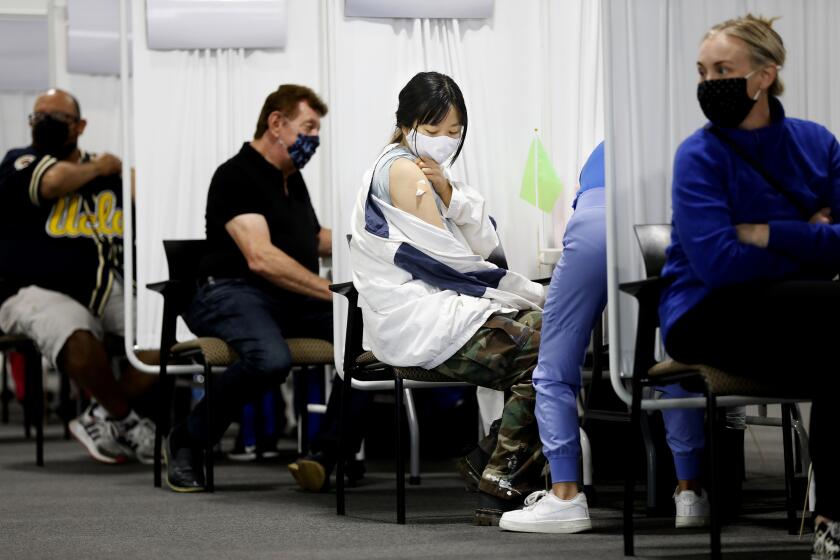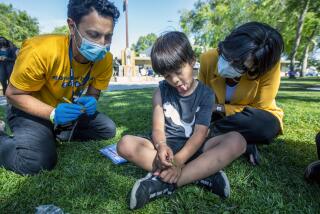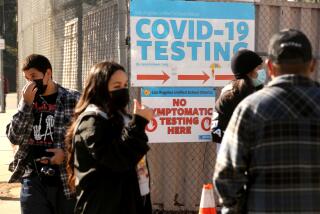Column: Johnson & Johnson eroded trust in all COVID-19 vaccines. Can it be rebuilt?
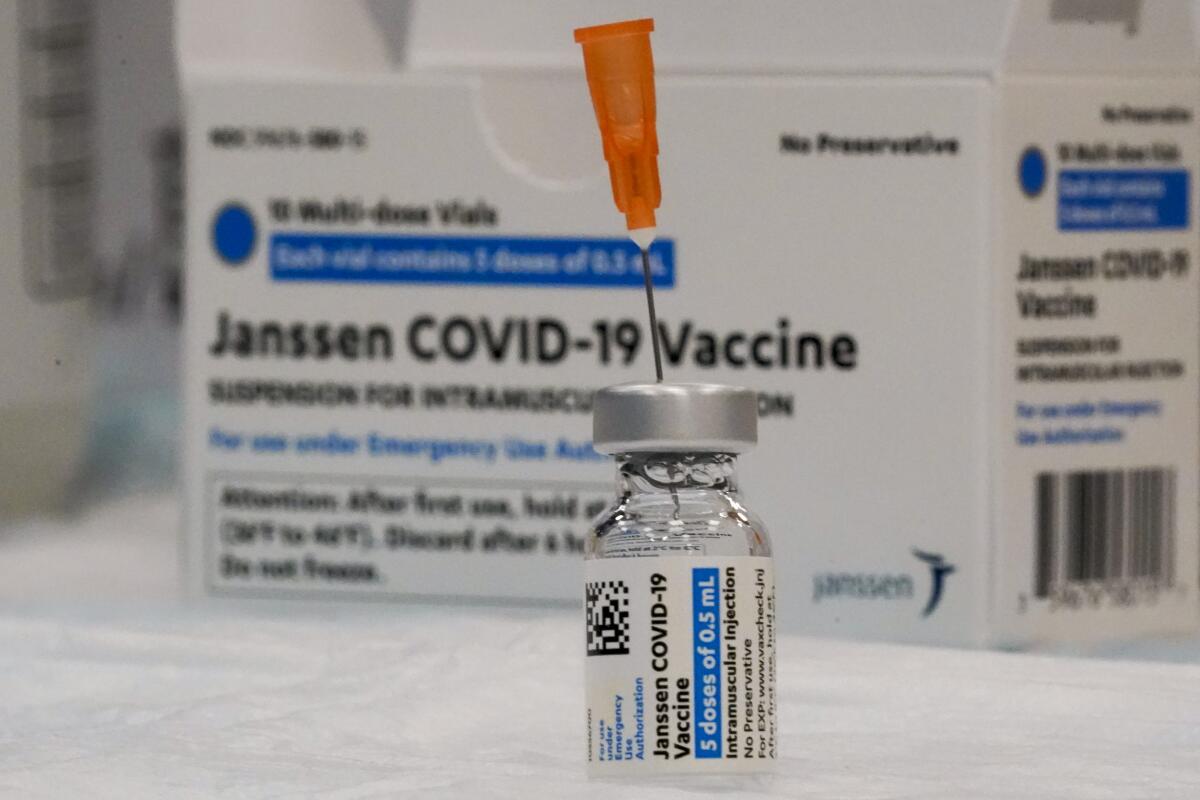
- Share via
Gone are the people in beach chairs, pecking away at their MacBooks and adjusting their AirPods while they wait hours in hopes of scoring a dose of a COVID-19 vaccine. Also gone is the line for appointments that for months had wrapped around the block, often before sunrise.
The narrow street with the entrance to Kedren Community Health Center is now mostly empty, though the neighborhood kids are still out in force, waving hopefully to passing drivers to get them to park in a driveway for $15.
On Thursday, Los Angeles County Department of Public Health officials repeated what they had been saying for days — that even though coronavirus cases continue to decline, they are worried because the demand for vaccines is declining too, opening the door for a deadly resurgence.
Countywide, appointments for people seeking their first dose are down about 50% — a reflection of a broader drop-off in the demand for vaccines statewide and nationwide.
“This past week we saw much fewer people coming in to get vaccinated,” L.A. County Public Health Director Barbara Ferrer said during a news briefing Thursday. “For the first time ever, we’ve had appointments at many vaccination sites that have not been filled.”
There’s perhaps no place in Los Angeles County where this is more evident than at Kedren Health in South L.A.
For months, this small mental health clinic-turned-vaccination site was the go-to place for privileged but ineligible Angelenos in search of leftover doses as well as the eligible but less privileged Angelenos in search of a friendly place to get the jab. Because of that, Kedren Health became a symbol for both the challenges and the necessity of vaccine equity.
But these days, the Facebook groups where hundreds of vaccine chasers eagerly swapped tips for scoring what was once a scarce dose have largely fallen silent. In one group, one of the last posts was from a man who showed up before dawn at Kedren Health to stand in a line that probably never materialized, prompting merciless mockery from others.
Get the latest from Erika D. Smith
Commentary on people, politics and the quest for a more equitable California.
You may occasionally receive promotional content from the Los Angeles Times.
Dr. Jerry Abraham, in charge of the vaccination site, has been watching all of this unfold with a deep sense of unease.
Echoing Ferrer, he is worried that people seem to have lost interest in getting vaccinated. And like her and other public health officials, he believes it started with the federal government’s decision to pause distribution of the one-shot Johnson & Johnson vaccine following reports of a rare but dangerous blood clotting disorder in people who had gotten the shot.
The shots were cleared for use again after health officials determined the risk of such severe side effects was extremely low, affecting only a handful of people.
But Abraham worries that, though the pause was necessary to ensure public safety, the damage has been done. People who were once on the fence about getting vaccinated — or even getting their second dose — may now have decided against it entirely or decided to wait a few more months.
“They may look at what’s happening with J&J and go, ‘Maybe I’ll just wait a little longer,’” Abraham said. “It’s a setback because for us to achieve that 70% herd immunity, we really need to be firing full [on] all cylinders — Pfizer, Moderna and J&J.”
According to a recent Washington Post-ABC News poll, fewer than 1 in 4 unvaccinated Americans said they would be willing to get the Johnson & Johnson vaccine, and fewer than half said they consider the brand very or even somewhat safe.
In some ways, this kind of thinking is no surprise — particularly for Black people.
Long before there were reports of blood clots, there were concerns that the Johnson & Johnson vaccine was a second-class shot when compared with offerings from Moderna and Pfizer.
The COVID-19 vaccine from Johnson & Johnson will save lives. But public health officials must address the false narrative that it’s a lesser vaccine.
Much of the distrust had to do with efficacy ratings. Johnson & Johnson ranks the lowest on paper, but it’s impossible to make head-to-head comparisons with Moderna or Pfizer because the clinical trials were conducted at different times and under different conditions.
Adding to the wariness was a fear that the Johnson & Johnson vaccine, because of its easy-to-store, one-shot formula, would be funneled into Black and Latino neighborhoods and into homeless encampments. How much of that has happened is unclear. Kedren Health, for example, now offers people their choice of brands — a wise move.
What is clear, though, is that the pause in distribution in Johnson & Johnson, however necessary, has only reinforced the notion that the one-shot vaccine shouldn’t be trusted.
The irony is that few companies have been dragged more — and by Black people in particular — than Johnson & Johnson for “hiding” potential problems with their products.
Nearly a year ago, the company announced that it was discontinuing sales of its talc-based baby powder in North America, bowing to the reality that it was unlikely to overcome the questionable narrative that its product causes ovarian cancer.
At issue is whether the talc contained trace amounts of asbestos. The science is inconclusive at best, as multiple studies have shown, including one last year in the Journal of the American Medical Assn. Meanwhile, Johnson & Johnson continues to say its baby powder is safe.
And yet, it took consumer advocates asking questions about asbestos and then litigation for it to come out that Johnson & Johnson had discussed the issue internally for decades and had developed a cornstarch alternative.
Consumers — including Black women, long one of the most frequent users of talc-based baby powder — have since filed thousands of lawsuits against the company, all arguing that it failed to warn them of potential risks. There also have been several government inquiries.
This is why, even today, even with the murkiness of the science, just about every Black woman I know swears up and down that baby powder causes cancer and Johnson & Johnson hid it from us. And it’s why, even though Johnson & Johnson appears to have done the right thing this time, being proactive about helping federal officials investigate reports of blood clots, people still don’t trust its COVID-19 vaccine.
This is the no-win scenario that comes from decades of distrust of institutions brought about by unchecked systemic racism. There is no right answer.
But perhaps all is not lost.
Providers in California have given a promising number COVID-19 vaccinations. Now health officials worry demand is topping off — and way too soon.
Next week, California is scheduled to receive almost 90,000 doses of the Johnson & Johnson vaccine. That’s on top of the existing glut of vaccine doses countywide.
To use Kedren Health’s allotment, as well as the boxes of Pfizer and Moderna vaccines that are piling up in the clinic’s freezers, Abraham anticipates having to open more pop-up clinics in partnership with churches, for example.
Going door to door also probably will become more common because now that the rush to line up at all hours is over, getting to herd immunity will mean persuading people who are on the fence.
In the meantime, not everyone is shunning the Johnson & Johnson vaccine. Several doctors told me that people who don’t want to deal with the side effects of the two-dose formulas from Moderna and Pfizer are requesting it, as are people with plans to travel out of the state or the country who worry they won’t be able to make it back for a second shot.
“If I’d had a choice, I would’ve gotten the Johnson & Johnson because it’s one-shot deal,” Moah Dejene told me while he was waiting to leave Kedren Health after getting his second dose of Moderna recently.
Then again, that was before news of the blood clots. Now the decision would be harder.
More to Read
Get the latest from Erika D. Smith
Commentary on people, politics and the quest for a more equitable California.
You may occasionally receive promotional content from the Los Angeles Times.
